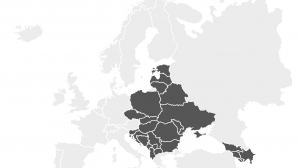Ádám Schönberger, founder and director of MAROM, an NGO created to regenerate and reinvent Jewish culture in Hungary, is one of many activists who sees such a black future for civil society organisations in Budapest.
“The future is already here. If there is no interest from the EU and the democratic world to intervene in Hungary, most of the NGOs existing today will either disappear or won’t be able to work at the same scale they used to.”
A blurred law
The law introduced a new category of NGOs: organisations living on foreign support, which now have to register on a special list and display a label on their websites and their publications. Although the law was meant to bring transparency to such foreign-funded organisations, it has served as a tool to stigmatise and silence independent voices.
“Based on the 2017 anti-NGO act, some 130 organisations registered as being foreign-supported. The Hungarian Civil Liberties Union (HCLU) and six other organisations decided to boycott the law and infringement procedures are still pending at the European Court of Justice,” says Stefania Kapronczay, the HCLU’s executive director.
“The government and pro-government media often refer to our organisations as not compliant with the law, which causes reputational damage,” she tells Emerging Europe.
This can affect funding. One human rights NGO was hit so hard by the law that during the last three months of 2018 it had run out of reserves and had to stay closed for weeks, because it couldn’t fill its shelves with the food or basic hygiene products it offers those in need.
Mass hysteria
When money is not the problem, people are. A concerted government campaign is exerting leverage on people’s fears, making it almost impossible for NGOs to get their jobs done.
“[Viktor] Orbán’s propaganda brings the worst out in people: it redirects people’s deepest fears towards groups that cannot even be lumped into one, because as long as we are terrified, we do not talk about the conditions of hospitals or the lagging education system,” commented András Fekete-Győr, leader of opposition party Momentum.
In 2017, the village of Őcsény, in southwest Hungary, called an emergency assembly to discuss the arrival of a few people, mostly women and children, who had already received refugee status from the Hungarian state. They were meant to stay for a few days of vacation, organised in cooperation between Migration Aid and a local guesthouse.
“People were just shouting things like, ‘These people are animals, they’re not even human. They’re terrorists, they’re going to blow things up and rape the children’”, reported the former Őcsény mayor János Fülöp.
Back then, politicians from the ruling Fidesz party and government media insisted that Migration Aid was settling illegal migrants in Hungarian villages as part of what it has termed “the Soros Plan”.
“I understand that they are afraid, because this is exactly what government propaganda has set out to do over the last two years: to make Hungarians feel afraid,” the director of one NGO, who asked to remain anonymous, told Emerging Europe.

Mixed messages
One of the biggest challenges for Hungarian NGOs is how to get the right messages across the media landscape.
“In November 2018, a new media empire was created by owners who donated 476 media outlets, including websites, newspapers, television channels and radio stations with a combined revenue of about 190 million euros in 2017, to the Central European Press and Media Foundation (KESMA), a foundation founded and run by Prime Minister Orbán’s loyalists,” Mrs Kapronczay says.
“These outlets do not provide balanced reporting about the work of independent NGOs,” she continues.
Furthermore, since last year, being homeless in Hungary has constituted a criminal offence under a new law banning “habitual residence in a public space”. Police have the power to remove homeless people from the streets and destroy any shelters they build. The same fate awaits all those who help them, punishable with fines or imprisonment.
The United Nations and the Venice Commission have both raised concerns and the European parliament has approved a report which could trigger Article 7 of the Treaty on the European Union, as it views Hungary risking a breach of the EU’s founding values.
But last year also saw another controversial law approved by the Hungarian parliament, which raises even more concerns. By 2020 new courts for administrative cases will be established giving greater powers to the minister of justice. Decisions of these new courts will affect fundamental rights such as matters related to elections, abuses of power by the police, asylum or the exercise of the right to peaceful assembly.
According to the Hungarian Helsinki Committee, the law will significantly undermine the independence of the judiciary, as the boundaries between the executive and judicial power will be blurred, paving the way for political interference in legal matters.
‘State institution’ doesn’t translate into help
The fact that courts are also siding with the government leaves NGOs with little judicial support.
“The ongoing smear campaign has an impact on cooperation with state institutions, ranging from schools to the police,” explains Mrs Kapronczay. “Many organisations had fruitful cooperation with such institutions, but they are often terminated or just simply stopped because the state institutions are afraid of cooperating with independent NGOs, especially those engaging in human rights or anti-corruption matters.”
The Auróra Community Centre, run by MAROM, is struggling to remain open. Situated in the heart of the eighth district of Budapest, Auróra is a social enterprise which was created to strengthen the civil sector, inspire cooperation among organisations and provide them with publicity.
“As a Jewish organisation we have been a target ever since this government came into the picture,” MAROM director Ádám Schönberger tells Emerging Europe.
“The municipality has tried to close Auróra many times, sending drugs controls, trying to buy the building in order to evict us, sending policemen every day. According to them we are a problem for the neighbourhood because of the noise that comes from our centre. The municipality created an ad hoc resolution, according to which if at least 50 per cent of our neighbours complain, the place will be closed. Their employees went door to door asking people to sign a petition, but they didn’t get even close to 50 per cent. So, the district mayor himself went door to door, promising building renovations for all those who signed. They still didn’t succeed,” he adds defiantly.
The future looks black for all NGOs in Hungary whose work does not conform to the government’s agenda. Mr Schönberger still hopes that the EU will intervene and stop treating Hungary as a democratic country, perhaps even cutting off EU funds.
Perhaps the most pertinent point was made by the NGO which, so fearful for its future and of government reprisals, it asked me to keep its name out of this piece: What will remain of this country, if there is so much hatred and fear in the people? One day Hungary will have no more refugees, but the hatred and the fear will remain.






[…] se i na svojim dokumentima/internet stranicama napisati da ovise o stranoj podršci. Na kraju 130 takvih organizacija u Mađarskoj se registiralo dok je 6 njih bojkotiralo zakon koji su dali na […]